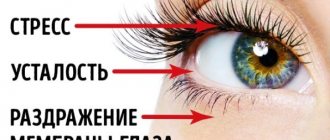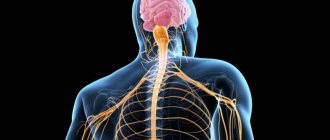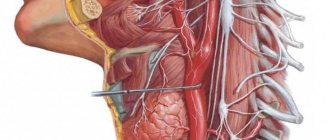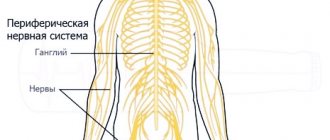Many people are interested in what a neurologist treats in adults and when to contact him.
A neurologist is a medical specialist who diagnoses and treats pathologies affecting the central and peripheral nervous system.
To become a neurologist, you need to graduate from a medical school with a degree in general medicine or pediatrics and specialize in neurology.
When to consult a doctor
It is recommended to consult a specialist if:
- headaches and dizziness, especially if they are accompanied by nausea and increased blood pressure;
- shooting pains in the face;
- pain in the limbs, back and neck;
- decreased sensitivity (pain, temperature);
- progressive muscle weakness;
- stiffness in the body;
- trembling, tingling and numbness of the limbs;
- uncontrolled movements of the arms or head;
- convulsions, fainting states;
- insomnia or increased sleepiness;
- constant night awakenings;
- apathy, depression;
- increased nervousness, irritability;
- panic attacks;
- chills or hot flashes;
- loss of balance and ability to coordinate movements, unsteadiness of gait;
- memory impairment;
- violation of taste and smell;
- periodic loss of vision;
- the appearance of tinnitus;
- speech disorders.
Often, diseases of the nervous system manifest themselves with uncharacteristic symptoms. In such cases, a therapist can refer you for a consultation with a neurologist.
It is recommended to visit a specialist annually for preventive purposes.
How to overcome a nervous breakdown and undergo treatment in Moscow
When a breakdown occurs, the best way out of it for the “breakdown” person is to experience his situation completely, that is, there is no need to push emotions inside, suppressing them within himself. It’s better to take them out, because periodic discharge is simply necessary. If you feel that a breakdown is close, but it hasn’t happened yet, try to switch to something and get distracted. The guideline here could be the following: the higher the tension inside, the more powerful the way to escape should be.
If you have any guesses about what caused it, try to eliminate or at least weaken such a source of tension. In situations where you do not know what the cause of the situation is, it is recommended to seek support from an experienced psychotherapist. The problem is that people clearly understand when treatment for drug addiction or other pathological addictions is required, and do not attach much importance to disorders of this type and psychological aspects in general. The big mistake of those who are faced with a situation of this kind is to ignore the problem itself in the expectation that everything will go away on its own, but this is not the case. Even if a nervous breakdown does not leave any mental consequences, it can still cause significant damage to health. That is why, with such a problem, there is no need to engage in independent treatment; it is better to seek help from a specialist. In Moscow, the best place to help you with nervous disorders and breakdowns is at the Renaissance RC, which is a branch of an international network of clinics.
What diseases does the specialist deal with?
Let's try to find out when a neurologist will help, what he treats in adults.
The doctor treats neurological disorders:
- intracranial hypertension;
- nervous tics, tremors;
- cranial and spinal injuries, as well as their consequences;
- Alzheimer's and Parkinson's diseases;
- multiple sclerosis;
- stroke and its consequences;
- paresis and paralysis;
- neuralgia, neuritis, plexitis;
- migraines, headaches;
- pain in the neck and back;
- painful prolapses caused by nerve damage;
- seizures, epilepsy;
- cauda equina syndrome;
- torsion dystonia;
- encephalopathy;
- osteochondrosis;
- radiculitis;
- intervertebral hernia;
- Wilson-Konovalov disease;
- Crouzon and Dandy-Walker syndromes;
- arachnoiditis;
- leukodystrophy;
- myasthenia gravis;
- neurofibromatosis;
- blepharospasm;
- syringomyelia;
- vertebrobasilar insufficiency;
- meningitis, encephalitis;
- insomnia;
- sleep apnea syndrome;
- tumors of various etiologies.
The listed diseases are often accompanied by changes in mentality and behavior. In this case, it may be necessary to consult a psychiatrist or psychotherapist.
Principles of treatment
What does a neurologist do when there is already a diagnosis? Begins to treat the disease using different methods.
Medicines
To relieve acute pain and inflammation, medications are prescribed, and maintenance therapy is provided if necessary. Problems with blood vessels, concussions, epilepsy, and conditions after surgery almost always require medication.
Manual therapy
Manual therapy is a treatment with hands (from the Latin manus - hand), which helps eliminate functional blocks and muscle spasticity, normalize microcirculation and range of motion. Widely used for diseases of the joints and spine, neuroses.
Massotherapy
One of the most effective methods of treating neurological diseases, along with therapeutic exercises and physiotherapy. Using special techniques, the specialist gently influences the patient’s body to stimulate the body’s natural recovery processes.
Physiotherapy
Through physical techniques, it is possible to accelerate tissue regeneration processes, improve nerve conduction, thereby reducing the intensity of pain and inflammation.
Reflexology
The essence of the method is the impact on bioactive points to restore the disturbed balance. It is based on the idea of the body as an integral system, when one of its elements fails, others suffer.
Traction traction
Used to stretch limbs and muscles in case of bone fractures and diseases of the spine.
Kinesitherapy
“Movement treatment” is how this term is translated from scientific language. This is a type of physical therapy that combines medical, physiological, and biochemical aspects.
Osteopathy
This is a method similar in effectiveness to massage and manual techniques. But, unlike them, it affects the very cause of the disease, helping to restore the well-coordinated functioning of the body.
Therapeutic blockades
For severe pain that cannot be relieved with conventional medications, the sore spot is injected. Injections are made directly into the painful area, hitting the nerve endings. The procedure relieves a person from pain in a matter of minutes for a period of half an hour to several days.
What does a neurologist treat in children?
A pediatric neurologist will help with:
- developmental delay;
- attention deficit symptom;
- Down syndrome;
- hyperactivity;
- convulsions and fainting;
- epilepsy;
- polio;
- hydrocephalus;
- phenylketonuria;
- West syndrome;
- cerebral palsy;
- birth and hypoxic lesions.
The specialist also monitors infants, which allows timely detection and elimination of the slightest pathologies.
How does a neurologist differ from a neurologist?
Now you know who a neurologist is and what he treats in adults. Who is a neurologist, and how does he differ from a neurologist? It turns out that these are two names of the same profession.
In connection with frequent disorders in the functioning of the nervous system, a science was created that studied the structure and functions of the nervous system, clarified the mechanism of failures, and developed methods to cure existing pathologies. It was called neurology, and specialists began to be called neuropathologists. In the 80s of the last century, changes occurred in the Ministry of Health, as a result of which neurologists were renamed neurologists.
Diagnostic methods
In order to make an accurate diagnosis, it is first necessary to understand the clinical picture of the disease. Therefore, the doctor begins the study with a detailed interview of the patient, and also directs him to undergo various tests. This may include general, biochemical and bacteriological blood tests, a urine test, as well as a blood glucose test, an immunological examination, and a spinal cord puncture.
In addition, modern hardware diagnostic methods provide assistance in finding the cause of the disease. These are ultrasound, x-ray, magnetic resonance and computed tomography, encephalography, neuromyography, electrocardiography.
The more accurate the diagnostic results, the more effective the therapy will be. Diseases of the nervous system are insidious. Missed symptoms or incorrect treatments can lead to death or severe disability.
How does the consultation work?
At the first appointment, the doctor listens to the patient’s complaints and collects an anamnesis of the disease. He asks about age, marital status, characteristics of professional activity, finds out the localization, nature and intensity of pain, factors causing pain, the presence of chronic and hereditary diseases. Then he examines the patient, conducts palpation and tests to assess visual and olfactory acuity, speech skills, reflexes, coordination of movements, sensitivity, and muscle strength.
Preparing to visit the doctor
A psychoneurologist is interested in the dynamics of the development of physical and emotional health. That is why the patient must bring to the appointment a medical card with extracts from the medical history and the results of previously completed psychological tests.
The doctor must also provide a list of medications you are taking. When compiling it, the exact names of the drugs, their dosage and the side effects experienced are indicated.
During the initial examination, the patient will feel more confident if he writes down questions for the doctor in advance (for example, about the duration of the therapeutic course, the need for consultations with related specialists, the prevention of subsequent exacerbations, etc.).
Diagnosis and treatment
After a visual examination, the neurologist refers the patient for examination, which may include:
- echoencephalography of the brain;
- neurosonography;
- myelography;
- electroencephalography;
- electroneuromyography;
- cerebral angiography;
- ultrasound encephaloscopy;
- Doppler ultrasound scanning;
- CT, MRI or PET;
- lab tests;
- lumbar puncture.
Based on the diagnostic results, the doctor makes a diagnosis, determines the cause of the pathology and individually selects the optimal treatment, taking into account the type and stage of the disease, as well as the general condition of the patient and the presence of other diseases. It includes taking medications, injections, massage, physiotherapeutic procedures, physical therapy, biofeedback therapy, and psychotherapeutic techniques. In severe cases, surgery may be necessary.
During an exacerbation of the disease, the doctor may prescribe bed rest. During the treatment process, he monitors the patient’s condition and, if necessary, makes treatment adjustments. At the end of the treatment course, the neurologist gives advice to avoid relapses.
What does a neurologist do?
The specialization of a neurologist is a detailed study of complaints, primary symptoms, the patient’s condition as a whole and treatment of detected problems of the autonomic system, diseases associated with the functioning of nerve fibers, disorders of the normal functioning of the nerves of the spinal cord and brain.
The competence of a neurologist includes diagnosing the primary causes of the disease, identifying its nature, as well as studying the impact they have on the patient’s health and functioning. A competent specialist quickly and with maximum accuracy determines the nature of the disease and selects an effective treatment for the identified disease. Neurologists believe that the main reasons for the appearance and development of pathologies of the nervous system are:
- infections (bacteria, viruses, fungi);
- bruises, tumors, vascular problems;
- hereditary or chronic diseases of different nature and nature;
- poor nutrition, insufficient amounts of vitamins and nutrients;
- the impact of chemicals on health;
- serious forms of poisoning (medicines or heavy metals).
If we explain in simple words the specialization of a neurologist, we can say that he studies the relationship between the central and peripheral nervous system and human well-being. You can come to him with absolutely all pathologies that are associated with damage to the functioning of nerve fibers. A neurosurgeon performs surgical intervention in the treatment of such diseases in a patient. And the most sought-after specialist in our time is a neurologist who treats chronic fatigue.
Advice from a neurologist
The proper functioning of the nervous system is important for the health of the body, as it controls the coordinated functioning of all organs.
To avoid nervous diseases, it is recommended to follow several rules:
- eat rationally;
- sleep 7-8 hours a day;
- to refuse from bad habits;
- doing physical exercise;
- walk in the fresh air for at least 2 hours.
You can make an appointment with a neurologist at Ryazanova Private Office LLC by phone or using the online form “Request a call back”. Our administrator will call you back and select the best time for you to visit a specialist.
Educational program on medical professions. When to contact a neurologist?
We have form because of the skeleton. Muscles are our “engines”. However, who controls them, as well as many other systems in the body? Who is the leading “manager” (or one of them) in the company called “organism”? And who should I contact if the “manager” gets sick?
We talked about this and much more when we visited a neurologist and chiropractor at Clinic Expert Voronezh LLC, Candidate of Medical Sciences Viktor Fedorovich Opletaev.
- Victor Fedorovich, tell me, who is a neurologist and what problems does he help solve?
This is a doctor who treats various diseases of the central nervous system - the brain and spinal cord, as well as peripheral nerves. In addition, the neurologist is responsible for the pathology of the autonomic nervous system.
-What diseases do you encounter most often in your practice? What do contemporaries suffer from?
This is spinal osteochondrosis with hernias and protrusions of intervertebral discs, their complication – compression of nerves and roots, as well as cerebral atherosclerosis and its complication – ischemic stroke. Neuropathies and “tunnel syndromes”, consequences of traumatic brain injury, are common.
Does osteochondrosis exist? The radiologist at MRI Expert Yelets LLC, Evgeniy Valerievich Yavorsky, tells
- Neurologist or neurologist: is it the same thing or is there a difference between them?
Previously, in our country, this term meant the same doctor. However, the name “neurologist” has been considered obsolete for a relatively long time, and the modern term is “neurologist”.
You can find out the cost and make an appointment with a neurologist in your city here (note: the service is not available in all cities)
In addition, in foreign literature you can find the term “neuropathologist”, which closely resembles our neuropathologist. However, it is important here not to confuse these concepts: a neuropathologist is a kind of pathologist who specializes in diagnosing diseases of the nervous system in the form of viewing biopsies of nervous tissue, etc. Those. These specialists do not treat patients. Their analogue to our neurologist is a neurologist.
-What is the difference between a psychiatrist and a neurologist? Which of them treats epilepsy, panic attacks, depression, Alzheimer's disease?
Psychiatrists deal with diseases in which no “visible” (during diagnosis, including instrumental) organic pathology is detected. For example, with a hemorrhagic stroke, you can see obvious pathological abnormalities in the form of a ruptured vessel and hemorrhage into the brain tissue - either on an MRI of the brain or at autopsy. When an intervertebral disc is herniated, its fragment is clearly visible, which can put pressure on the nerve root; it is possible to detect conduction disturbances with neuromyography. In mental illnesses, structural changes are not detected, i.e. they are usually functional and related to a person's mental functions.
Find out the price for an MRI of the brain at the Expert Clinic
If we talk about who treats what, there is no clear, “black and white” answer. For example, a neurologist deals with epilepsy and Alzheimer's disease, but if complications arise in the form of mental disorders, then a psychiatrist is also involved in the treatment.
It’s about the same with panic attacks: since they are based on severe anxiety, psychotropic drugs can be prescribed, as well as psychotherapy, which in relation to mental illnesses is most often dealt with by psychiatrists or psychotherapists as specialized specialists.
Find out the cost of seeing a psychiatrist at the Expert Clinic (note: the service is not available in all cities)
Depression is usually treated by psychiatrists.
- Victor Fedorovich, what kind of neurologists are there? Can an adult neurologist treat children?
Yes, legally this is possible. However, in practice, it is advisable for an adult neurologist to undergo additional training in pediatric neurology in order to better understand the peculiarities of the pathology of the nervous system characteristic of childhood.
- How to understand that you need to visit a neurologist? What symptoms should signal that it’s time to see a doctor?
The manifestations are very diverse. These are headaches, dizziness; back pain radiating to the arm, leg, chest, heart area; disturbances in memory and sleep, perception of information, deterioration in the ability to concentrate; sensations such as numbness, tingling, goosebumps, weakness in the arms and legs, and others.
- What happens at an appointment with a neurologist and is it necessary to prepare for it in advance, for example, undergo some kind of diagnostics or tests?
An appointment with a neurologist begins with a detailed questioning. All complaints, life history and illness are collected. Then a general as well as a special examination is carried out, including, among other things, an assessment of the patient’s neurological status. Based on the information collected in this way, a preliminary diagnosis is established, which is mostly clarified with the help of additional laboratory and instrumental research methods.
Of course, it is possible to undergo a preliminary diagnosis, but it is better to first consult a doctor, since in this case the patient will be prescribed exactly those research methods that he really needs. Let's say a person has frequent headaches and needs an MRI of the head to make a diagnosis. However, if a person - not a doctor - undergoes this study, then at an appointment with a neurologist it may turn out that he would also need to have an MRI of the vessels of the brain and the cervical spine.
- How often should you visit a neurologist for prevention?
If a person is healthy: up to 40 years old - once every 2-3 years, after 40 - once a year.
- I would like to believe that every doctor is in his place, but still there are different situations in life and you can fall into the “wrong hands.” How to distinguish a good neurologist from a bad one?
Firstly, according to reviews, i.e. what your relatives, acquaintances, friends say about the doctor. Secondly, a good doctor will listen to you carefully, question you in detail and examine you. Thirdly, he will prescribe a further examination to help make a diagnosis.
- They say that “all diseases come from nerves.” Do you agree with this?
Certainly not. The nervous system actually carries out regulatory and control functions in the body, and disturbances in it can lead to various disorders, sometimes apparently unrelated to the nervous system. However, some diseases have their own, very specific causes, which are in no way connected with the nervous system. For example, many infectious diseases, injuries, etc.
- What do we, living at a frantic pace and time pressure, need to do in order to maintain a healthy neurological status?
No matter how familiar it may sound, the activities here are relatively simple. It is necessary to observe a work and rest schedule, get enough sleep, eat right, ensure a sufficient level of daily physical activity, avoid stressful situations if possible and learn to deal with them correctly.
You may be interested in our other materials:
Ischemic and hemorrhagic stroke: what is the difference?
How to treat hernias and protrusions of the spine?
How is manual therapy beneficial?
For reference:
Opletaev Viktor Fedorovich
Graduate of the Faculty of Medicine of the Kirov State Medical Academy in 2009.
In 2010 he completed an internship in the specialty “Neurology”.
In 2012, he underwent professional retraining in manual therapy.
From 2012 to 2015 - postgraduate study, defense of a dissertation with the award of an academic degree of Candidate of Medical Sciences.
He completed advanced training in neurology and manual therapy.
In 2015, he received a mini-MBA certificate.
In 2021, he received a patent for a spinal traction device.
From 2021 to the present time he works at Clinic Expert Voronezh LLC. He holds the position of chief physician and conducts consultations as a neurologist and chiropractor.










